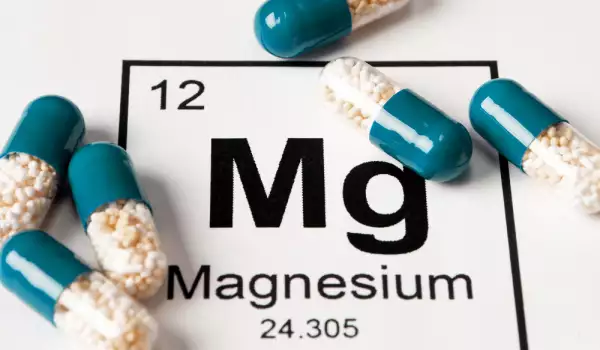Extremely dynamic hectic everyday life leads to constant fatigue and stress. Everyday lack of energy, depression and muscle stiffness are manifestations of these conditions, but more often the cause is magnesium deficiency.
The trace element magnesium is associated with longevity and the reason for this is the place it occupies in the functional work of the body. It is a vital mineral responsible for electrolyte balance, normal metabolic processes, energy production, nervous system functions, muscle function and good mental function.
The body of a healthy person contains about 25 grams of magnesium. 60% of it is in the bone system, a quarter is in the muscles. The remaining amount is in the brain cells, heart, liver and kidneys, being distributed fairly evenly between them.
There are about three hundred processes in the body in which magnesium plays an active role. In women, it is an important part of the normal course of the menstrual cycle, as well as of pregnancy. It participates in the functions of the intestinal tract and therefore magnesium is recommended even for babies when they suffer from colic pains.
For the good condition of the skin and the fresh youthful look, the credit goes again to this trace element. It supports the penetration of phosphorus and calcium into the bones. The element itself is also dependent on other elements to be well absorbed. The combination of magnesium with vitamin B6 enhances the absorption process of magnesium and increases the clinical effects of its use.

It is necessary to combine magnesium and vitamin B6 to ensure the preservation of vital tonicity and good sleep and this ensures the health of the whole body.
Magnesium cannot be synthesized and stored for a long time in the body and this requires regular intake and in sufficient quantities. If it is lacking in the body, anxiety occurs, a sense of nervousness, sensitivity and vulnerability develops. Sleep is disturbed and many other unpleasant conditions arise from it. A vicious circle is created - the lack of magnesium leads to stress, which increases the need for magnesium.
How to get it?
Food is the easiest and most affordable way to give the body the necessary amount of the valuable trace element. Fruit and vegetables, mainly green ones, are a good source of magnesium. Nuts, whole grains, fish and beans are other magnesium-rich foods.
During active physical activity, the amounts of magnesium received through food are often insufficient and an additional amount must be taken in the form of a food supplement. It is good to always take this with vitamin B6 to ensure that the magnesium will be well absorbed.




















Comments